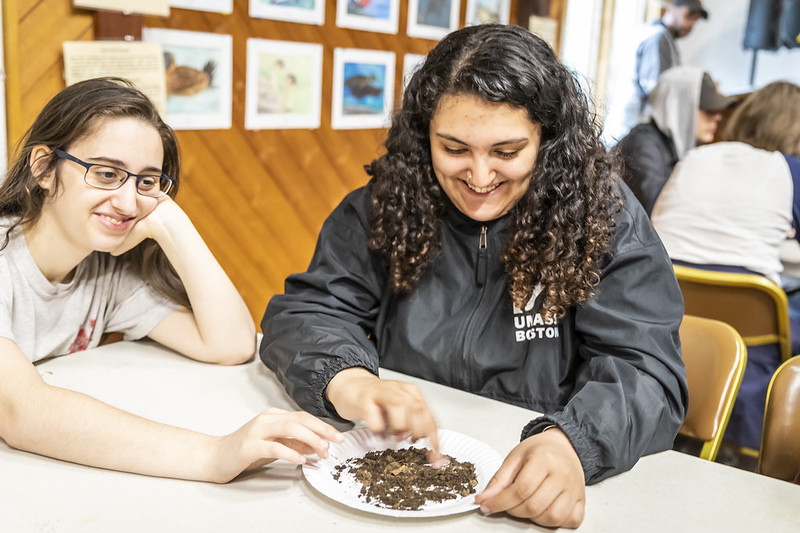Mass Audubon’s new innovative, classroom-based program, the Climate Democracy Project (CDP), helps students in grades 8-12 engage in local civic action around climate change.
Through grants from the Environmental Protection Agency and the Institute for Museum and Library Sciences, CPD brings Mass Audubon educators into public school classrooms in underserved Massachusetts cities to collaborate with classroom teachers and community partners on climate education.
Students in Pittsfield, Springfield, Worcester, Attleboro, and Fall River gain climate and civic literacy, identifying local climate justice issues of important to them and designing and leading civic action projects to address those issues.
Addressing Climate Change through Field Experiences
The CDP model focuses heavily on field experiences.
Students from Attleboro and Fall River visited Allens Pond Wildlife Sanctuary in South Dartmouth and learned how conservation and restoration of coastal ecosystems, like salt marshes, is critical for mitigating climate change impacts such as coastal flooding. They also participated in Youth Climate Leadership Program Summit.
Fall River students from Durfee High School visited City Hall, their local public library, and the Boston Museum of Science. At City Hall, students connected their in-class learning to real-world, local efforts and careers by meeting the mayor and staff in the City Clerk, Planning, Elections, and Water departments.
At Taconic High School, Pittsfield students studied the intersections of climate change with tree carbon and water quality. Located along the Housatonic River, and following decades-long concerns around contamination, water management remains a top climate concern among Pittsfield residents. Students in Taconic’s Environmental Science class (part of the Career and Technical Education programs at the school) will continue exploring the diverse intersections of technical skills, career pathways, and civic engagement with climate change work.
Through these experiences, students have an active hand in creating healthier, more resilient communities in their own hometowns.
Professional Development for Classroom Teachers
CDP embeds valuable professional development into the experience of classroom teachers, Mass Audubon staff, and our community partners. By mid-December, educator participants will have completed seven hours of learning designed to bolster their confidence teaching about climate change and civic engagement, and leading students through action projects.
With this strategy, the impact of Mass Audubon programming amplifies well beyond the hours when classroom teachers and their students are working directly with our staff. Teachers and community partners will also participate in a full day retreat summer 2025 to reflect on the program and refine it for next year.
Climate Democracy Project Reaches Wide Range of Students
Mass Audubon prides itself on our wide array of educational climate programs. CDP, like all our programs, fills a specific niche in the climate-education field.
By complementing the Massachusetts Department of Elementary and Secondary Education (DESE) Student-led Civics Project requirement for this age group, CDP integrates climate action into the school day using an existing school structure.
We partner with educators across subject areas—everything from Career and Technical Education programs to History to Marine Sciences—to creatively connect with diverse cohorts of students, many of whom are just beginning their climate journeys.
Mass Audubon’s other teen-oriented climate program, Youth Climate Leadership Program (YCLP), serves students already engaged in climate work. The combination of these two programs means that we reach both students who are already interested in climate change, and those who may not be. Learn more
Stay Connected
Don't miss a beat on all the ways you can get outdoors, celebrate nature, and get involved.



